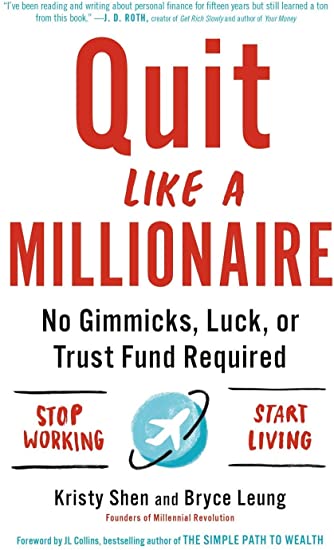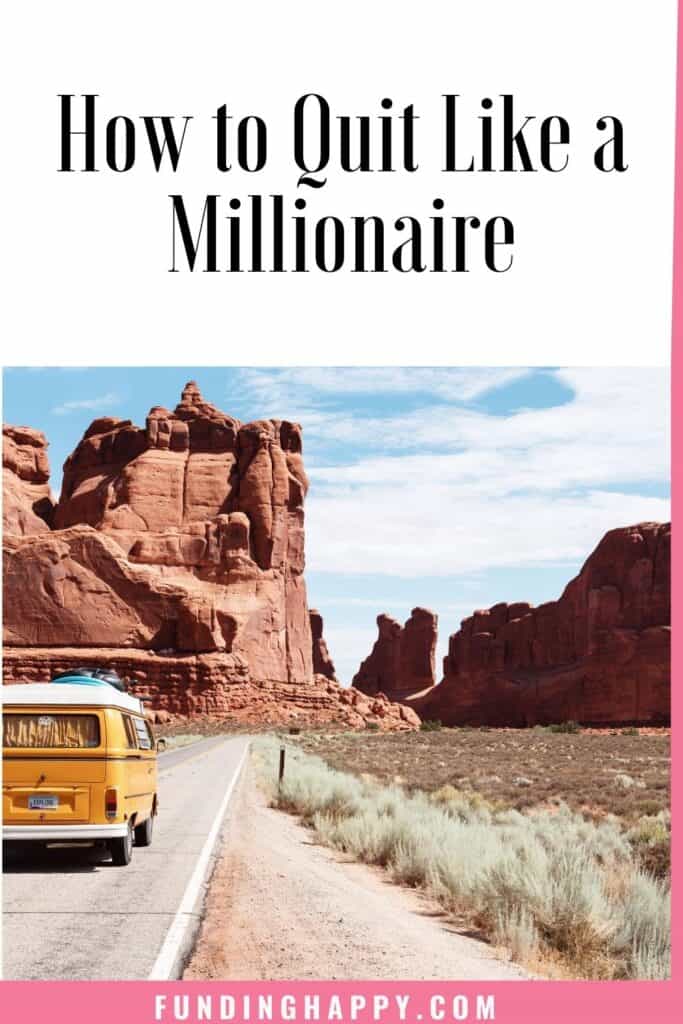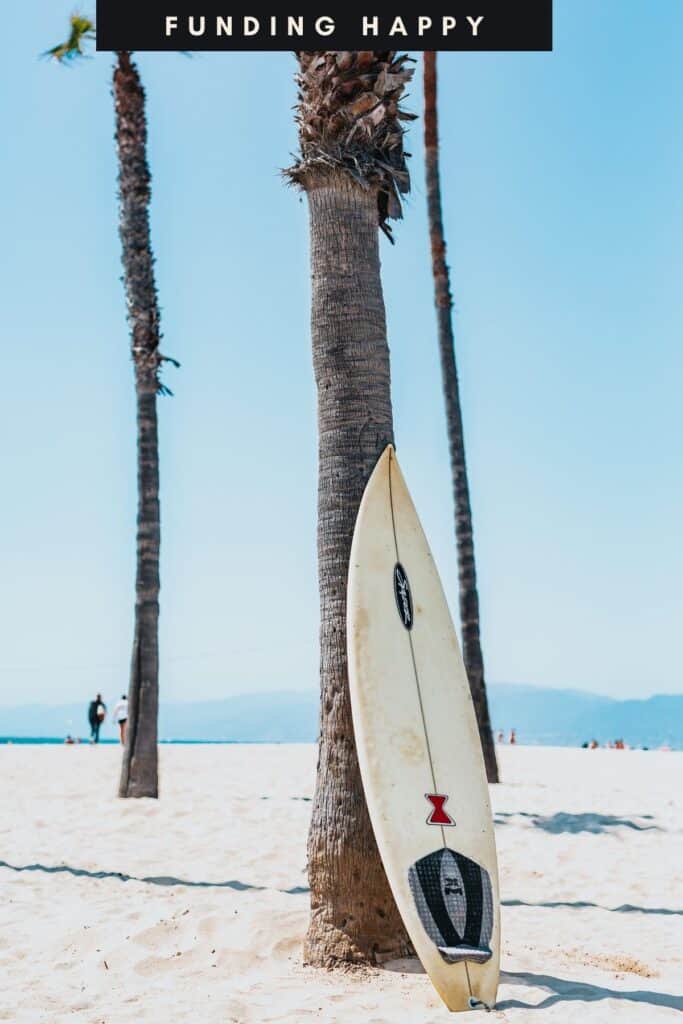Head's up, there could be affiliate links ahead!
I recently picked up the book Quit Like a Millionaire, and next to Glennon Doyle’s Untamed, this is by far the best book I’ve read this year. While I don’t agree with all of it, it certainly taught me new some new life-changing money strategies (that I’ve already started using).

I was schooled in tax optimization
Authors Kristy Shen and Bryce Leung shares some basic personal finance advice that completely blew my mind. I’m embarrassed to admit that after 3 years of writing a personal finance blog, that I had no idea how to tax-optimize an investment portfolio.
You want to know why I didn’t know these strategies? Because it’s #boringAF I mean, seriously – who wants to learn about this stuff?
But Kristy makes it easy. So easy in fact, that I had to snag the Kindle version after listening the audiobook, just to confirm that I wasn’t misunderstanding how easy it was. Bonds go in tax-advantaged accounts, and stocks go in after tax accounts. It’s that simple.
Don’t worry – I didn’t give away the ending.
My eyes were opened to traveling as an affordable lifestyle
Now, in general, I can see that a nomadic lifestyle is an affordable way to live, both by living in cheaper cost-of-living areas, and also because of some of the tax advantages it affords. However, this is where we start to diverge in our thinking.
In her book, Kristy breaks down how much her and her husband Bryce spent every month while traveling the world. I don’t know what kind of space you can rent in Thailand for $500 a month these days, but her per-night cost for housing while in the US was $25. That makes no sense to me unless you’re living in a hostel. A really bad one.
So, sure, you can retire to a life of budget travel and your million dollar portfolio might last forever. But the charm of traveling on the cheap wears off eventually – trust me on this.
Personally, I’d much rather work a bit longer and retire to a more sustainable lifestyle that I’ll feel comfortable with at every stage of life. Hostel-style travel isn’t as fun when you’re in your 50s when a good night sleep can make or break your entire day.

Bryce and Kristy’s Million Dollar Portfolio
Before I go further on the book, let’s break down the math of this couple’s retirement portfolio. At the time that they retired (at the age of 31) it was $1 million dollars, and based on the 4% rule, they could draw 4% of that million dollars every year and never have to worry about it running out of money.
While I believe the 4% rule has some merit (based on a study done at Trinity University in San Antonio, Tx in 1998), I don’t believe $1 million dollars or, therefore $40K per year is enough to retire with.
Even if you are able to avoid taxes completely on that income, $40K doesn’t afford you much. In fact, it’s barely double the poverty limit here in the US.
Who wants to sign up for a life like that?
It’s the same problem I see with most 30-something early retirees. They have not thought through the cost of aging, their potential for not wanting to count pennies for their entire lives, or what they’ll do if they need a hip replacement when they’re 58.
But that’s a conversation for another blog post, so let’s get back to the book.
Buying a house is not an investment.
That’s hogwash.
A lot of millennials are claiming this, and it’s just wrong. Sure, there is risk when buying and selling a primary residence, but as long as you’re willing to stay in it for the long term, you can still make money.
Kristy argues that the cost of ownership far outweighs the advantages, and that might be true in Toronto, the city we’re both from, but that’s not the only place to buy a home.
In fact, there are plenty of places where you can buy a home for an affordable price where the potential for appreciation is great. Also, keep in mind that here in the US, you can write off a portion of your mortgage, which you can’t do with rent.
Oh speaking of rent, that can be just as expensive as home ownership over the long term. That’s another thing the author seems to leave out – that whether you buy or rent, you still gotta live somewhere so that expense isn’t going away (like, ever). Unless of course, you’re opting for hostels or living in your parent’s basement for the rest of your days.
Anecdotally, I have owned six homes in my life, and only one of them was sold at a loss (we sold it for $40K less than we paid for it). But that was a vacation home, which is almost certainly not a wealth builder.
Every other home I’ve sold has seen a significant increase in sale price, from the lowest being $40K CAD for the sale of my first condo, to over $300K USD with the sale of my last house.
Now granted, in each of these scenarios, there were a lot of expenses with ownership, but they were never more than what I would have paid in rent for the equivalent space.
Bottom line, homeownership is still a great way to build wealth, especially if you’re willing to roll up your sleeves and enhance the value of your home while you live in it.
Don’t choose an educational path based on passion or interest
Kristy shares some great stories about her experience growing up and how it shaped her view of education and career training. As a result of growing up poor, she opted for an engineering path, not because she was passionate about it, but because it had the best income ROI.
While I think it’s smart to be wise with your university choices, I don’t believe that you can accurately assume a long term ROI based on a starting salary coming out of school. For example, while it’s true that STEM careers start out higher, they tend to even out with liberal arts degrees as careers progress.
Also, why go to school just to study something you’re not interested in, just to get a higher paying entry-level job? This is the kind of thinking that makes people hate working and naively aspire to retire early in the first place.
What if instead, you take an educational path that suits your strengths and interests and then aim to financially optimize your life around that career? A life well worked is a life well lived.
To go balls-to-the-wall for 7 years in a job you hate, only to retire out of it early and live near the poverty line for the rest of your entire life, sounds like a ridiculous waste of life.

Quit Like a Millionaire is one of the best personal finance books – here’s why
Even though I don’t agree with a lot of Kristy’s points, I still think she makes some powerful arguments that will inspire her peer group to reach for more. However, I also think she lacks the life experience to assume her retirement plans are sustainable.
The other reason I loved this book is that it’s one part learning, one part story. I really resonated with the author’s early life stories. I’m also a child of immigrants who grew up in Toronto with an ingrained mentality of lack and it has shaped all my life choices as well. Every fear she talks about I can identify in my own personal experience.
And that’s what I loved most about this book. She draws you into a story and guides you on a journey of what’s possible while subtly sliding in ultra-boring topics like tax-optimization in the most creative, non-boring way.
That’s not an easy thing to do!!!
Is this book just for millennials?
It’s clearly written for a younger audience, but there’s something for everyone to learn from it (back to that tax-optimization again). The funny thing about money is that at some point, you assume you’re old enough that you should know how to manage it, but that’s not the case. It’s a learned skill and you simply don’t know what you don’t know.
So to that end, I’d recommend this book to anyone who wants to learn about the potential to grow their personal wealth, regardless of age.




Leave a Comment